“Prometheus” Greek Teachers Association Kindles the Pages of Greek History; Advocates for the Future of Greek Education
by Athena Efter
The Greek Teachers Association “Prometheus,” founded in 1975, hosted its first symposium, “A Dedication to the Three Hierarchs, Greek Letters, and Greek Language,” on Sunday, February 17 at 3pm in the St. Demetrios School library in Astoria. The symposium, presented by the Federation of Hellenic-American Educators and Cultural Associations of America, along with the support of the Pan Pontian Federation of the US and Canada, was preceded by a luncheon in the church hall and had an attendance of over 125 educators, scholars, and members of the Greek community. Among those present were the Consul General of Cyprus Alexis Phedon and Nikos Andriotis, the School Board President of St. Demetrios Greek Afternoon School. Contributing remarks were given by Athena Phillipou, Director of the Direct Archdiocesan District Office of Education of the Greek Orthodox Archdiocese of America and Dimitris Molohides, President of the Pan-Pontian Federation of the US and Canada.
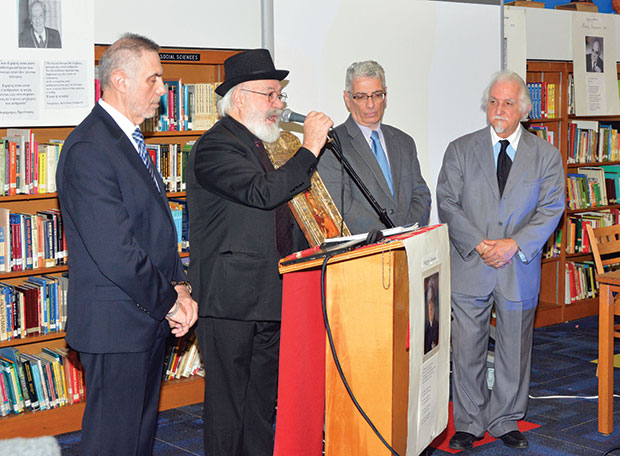
Dr. Ioannis Nathenas with Dimitris Molohidis, President of the Pan-Pontian Federation of USA & Canada, Dr. Panos Stavrianidis and Dr. Demosthenes Triantafillou; PHOTOS: ETA PRESS
Philosophy and the 100-year commemoration of the Pontic genocide that took place in the Greek colony of Asia Minor, now modern day Turkey, were the theme of this platonic type of symposium, where the virtues of speech, thoughts, and ideas were presented to create an open forum of dialogue. Initially, I wasn’t sure what the connection between a discussion on Asia Minor and the Pontic genocide had to do with practicums and methodologies in Greek education, but I walked away understanding that there was one.
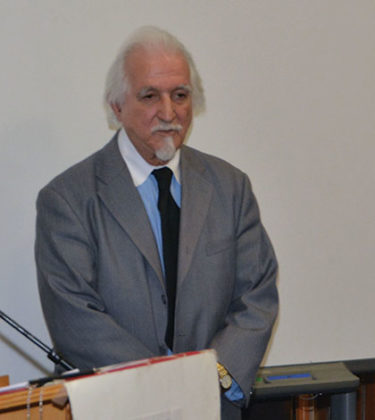
President of “Prometheus”, Dr. Demosthenes Triantafillou
Demosthenes Triantafillou, educator and President of the Greek Teachers Association “Prometheus”, was the host and moderator of the various presentations that began with a historical and cultural presentation of Asia Minor by keynote speaker Professor Panos Stavrianides who weighed in heavily on the destruction of Greeks and Christianity by the Ottoman Empire in Asia Minor.
Pontic, or Pontian Greeks, resided in Pontos, a Greek colony that continued to exist after its birth in the seat of the Byzantine Empire and remained until 1923. The Pontic genocide was not simply an attack against Pontic Greeks, but a greater attack on Greek civilization – its culture, society, and religion. There were several Greek communities that existed at that time in now modern day Turkey, until a nationalistic Ottoman fervor, initiated by Kemal Ataturk, became a holocaust against Greeks and other Eastern Orthodox Christians in the region. This holocaust, to eliminate anyone who didn’t belong, including Armenians, was supported by the the German Empire at that time.
One must ask then why didn’t Greeks and Armenians belong, as rightful citizens in their geographical birthright? While that may be a philosophical question and topic for another lecture, the fall of Constantinople, marked by the end of the Byzantine Empire in 1453 and the creation of the Holy Roman Empire in the west, eventually led to greater destruction for those who still remained in Anatolian territory with their Christian beliefs and their remnants of Hellenic culture. As Mr. Stavrianidis pointed out “Asia Minor was not just the seat of Greek culture, but the seat of Christianity and the Byzantine Empire. It was a place of mystery and myth that gave rise to many philosophers and poets, where Greek was the spoken language of a once flourishing empire.” According to Mr. Triantafillou “the Greek genocide during the Ottoman Empire is an historical event that has to be documented in Greek history and emphasized as a major turning point in the Greek diaspora.”
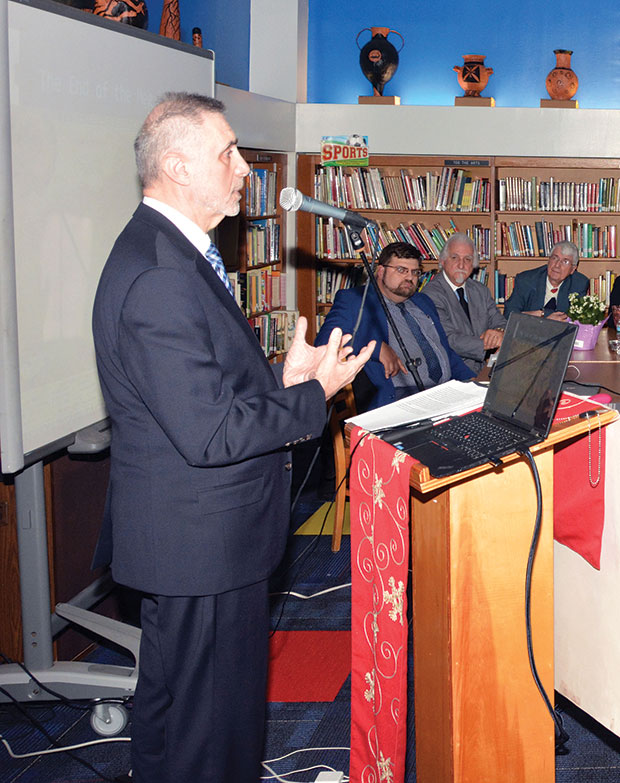
Dr. Panos Stavrianidis, keynote speaker at the Symposium
The purpose of this symposium, by bringing speakers to discuss the Greek diaspora and Greek education, was to open a dialogue on what are the problematic areas of Greek education and how to properly educate students of Greek language, history and culture today, so that they find the joy in learning about their Greek history and culture, especially as Greek-American students who attend after-school Greek programs, or as students who attend day schools where Greek language is incorporated into their curriculum. Many are children of the diaspora, and as Mr. Triantafillou vehemently expressed, “not enough is being done to educate them in the history, culture and contributions of their ancestry. We must revisit and revise the books and curriculum to include the catastrophe of Asia Minor and the genocide that followed, so that students can understand their history as Greeks. We must introduce Plato and Aristotle, and all the philosophical contributions that shaped our educational values. Language shapes our way of thinking. All political systems came out of Plato and Aristotle who educated the world. If we ourselves don’t understand them, we don’t understand our own culture. It is our duty as educators to appeal to the Greek education departments here and in Greece to make this effective change.”
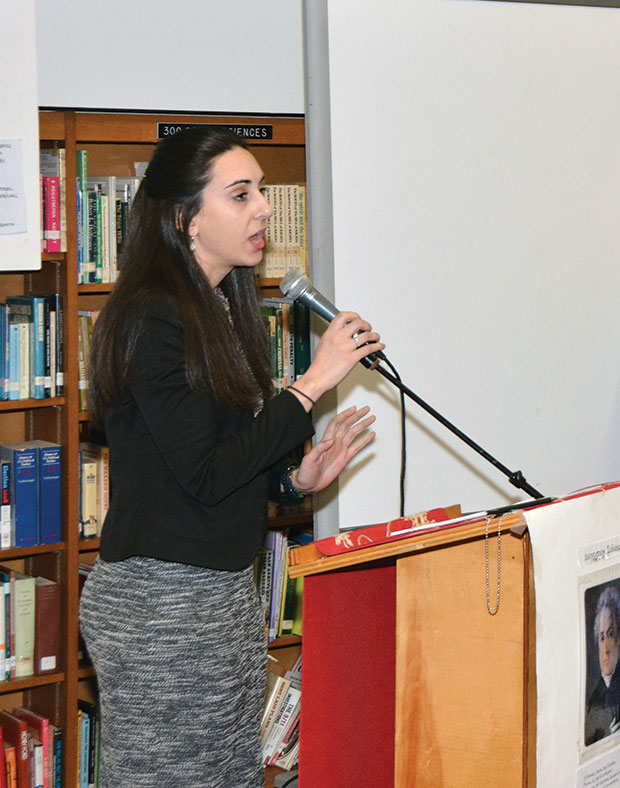
Mrs. Athena Filippou-Katehis, from the office of Education & Special Projects of the Greek Orthodox Archdiocese of America
Following the presentation of Asia Minor and its historical significance by Professor Stavrianidis were various presentations that included an understanding of Greek history and language through ancient manuscript by Alexander Colombos, the development of cultural identity through the celebration of Greek holidays in schools by Meropi Kyriakou, and the use of helpful resource books on Plato and Aristotle by Dr. Cleomenis Paraskevas.
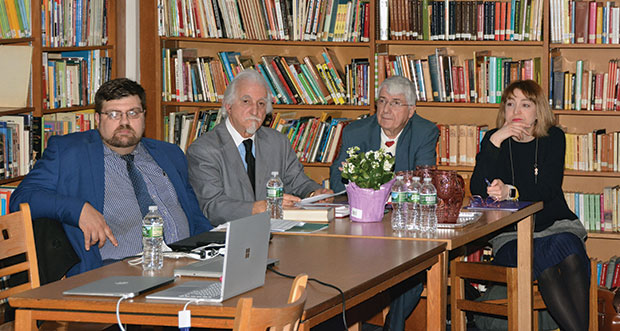
From left: Alexandros Colombos, Secretary General and Director of Technology, Dr. D. Triantafillou, Dr. Kleomenis Paraskevas and Meropi Kyriakou
The second half of the symposium included a reflection on the Jewish holocaust. Political Science professor Asher Matathias, a son of Greek Jews, gave a commentary on genocide and prejudice against Jewish people, which also reminded us of our shared history.
If we remember the past to educate ourselves and each other-to learn from it and not repeat it- then we also have to find ways to memorize that extensive list of long beautiful Greek words, filled with poetry and meaning, and repeat them. The last half of the symposium focused on the practical application and methodology of ideas and thoughts in Greek education. George Tsioulias, Co-Chair of the Greek Parade Committee 2019, discussed the organization of a Greek spelling bee competition for grades 6-8. Maria Dini gave a presentation on the “Google Classroom” on how students and teachers can use technology to communicate their homework assignments and engage in online study.
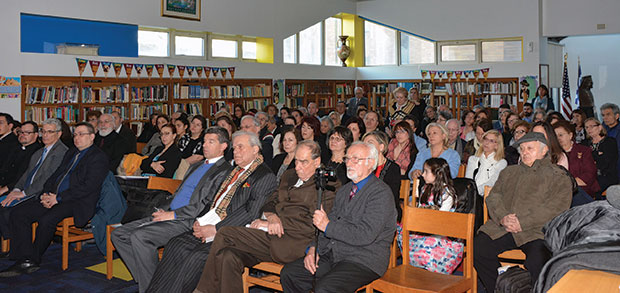
The Symposium which took place at the Library of the St. Demetrios of Astoria High School
The symposium ended with a final ode to the relevance of Greek language and letters with a presentation by educator Frederica Sagiani on why a Greek Language Spelling Bee Program is essential in teaching Greek to students who are learning an adherently rich language that is still valuable today – to make it an exciting one that fosters a love of Greek letters. The last presentation was given by educator Maria Sardi introducing the use of the books Klik sta Ellinika (Click in Greek), which were written by a team of experienced Greek language researchers and can be highly effective learning materials for students to attain proficiency with a Seal of Biliteracy in reading, writing and speaking a second language.
The program concluded with information about activities taking place towards the development of Greek education for the benefit of both students and teachers through the efforts of “Prometheus” Board members. A Greek essay contest will be held in memory of Dr. George Papanicolaou, a pioneer in medical advances for early cervical cancer detection and inventor of the “pap smear”, on May 16, at a luncheon honoring Archbishop Demetrios. Five students will be awarded scholarships of $250 each for best essays. Also in the works are the first ever Greek Teachers Pension Fund and an educational trip to Greece for graduating students of Greek Afternoon School programs. The fund and program are spearheaded by Demosthenes Triantafillou who has worked in the past to organize several summer educational trips to Greece.
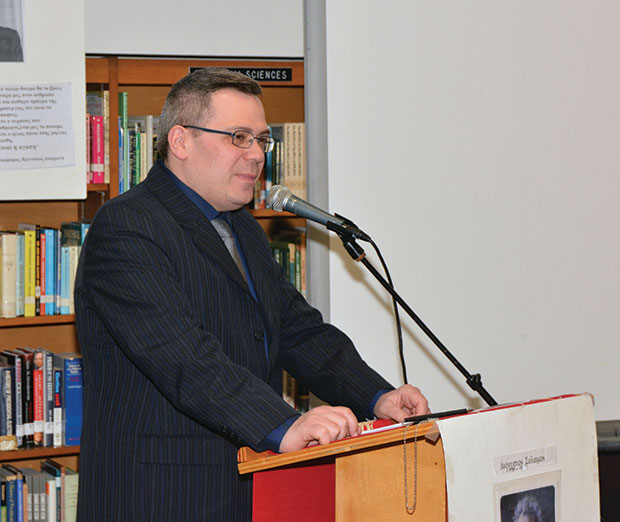
Consul General of Cyprus Alex Phedonos-Vadet
This year marks a commemorative year as the 100th anniversary of the genocide of Greeks in Asia Minor and the Greek diaspora. A history that has not been prevalently documented in books will be documented on foot on Fifth Avenue. On Sunday, April 22, the annual Greek Independence Day Parade in NYC, organized by the Federation of Hellenic American Societies, will have a special tribute to this dark chapter of world history. It’s not simply a sad chapter in Greek history alone. A genocide against any civilization or group of people based on their religious and cultural beliefs is a genocide against democracy. This special focus in the parade will represent a step forward in communicating it to ourselves as Greeks and to the world.
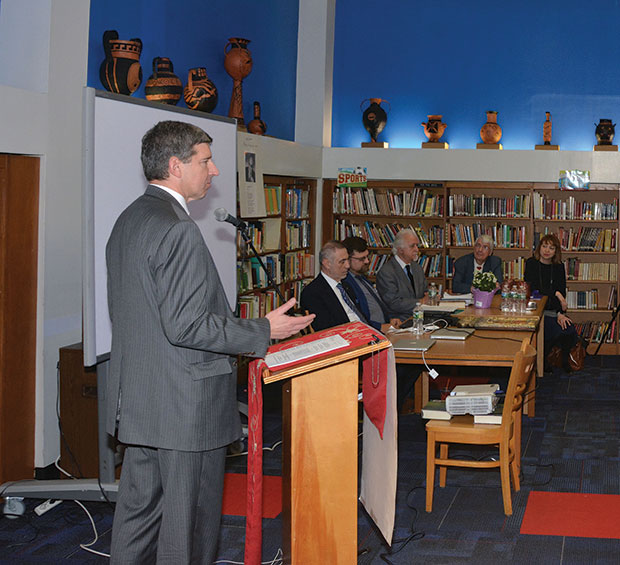
Dr. George Tsioulias, Chairman of the Greek Parade
This symposium marked a first in a series of symposia that will discuss methodologies and practicums for Greek school curricula in an effort to apply the Ancient Greek motto of “ever to excel” in education. Mr. Triantafillou was a very fervent speaker. His determination to change the way we teach Greek education echoed loudly throughout the room and was mirrored by all those who spoke, presented, and attended the lecture. He reminded us all that “psychology, physics, theology….all came out of the metaphysics of Aristotle’s teachings. Philosophy is the cure of the soul.”
We can’t change history, but we can change the way we learn it and teach it, so that it has the impact it’s meant to have on the future of education. The genocide of Greeks in Asia Minor must be taught, especially in Greek history books and classes, if not all history classes. It reminds us all that an attack on Greek culture is an attack on the world – the world of freedom and democracy that our forebears created. I can only surmise that if we educate ourselves in Greek first, and not as Greeks for the sake of being Greek, we can continue to educate the world.











0 comments